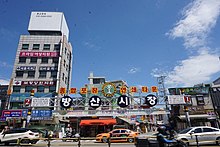Bangsan Market: Difference between revisions
m Dating maintenance tags: {{Citation needed}} |
Seefooddiet (talk | contribs) →top: Formatting for Korea-related articles, replaced: (나의 국토 나의 산하) → ({{Korean|hangul=나의 국토 나의 산하|labels=no}}), the Joseon Dynasty → the Joseon period, Jung-gu, Seoul → Jung District, Seoul |
||
| (19 intermediate revisions by 12 users not shown) | |||
| Line 1: | Line 1: | ||
{{Short description|Traditional market in Seoul, South Korea}} |
|||
{{Orphan|date=February 2013}} |
|||
{{Infobox Korean name |
{{Infobox Korean name |
||
| img = |
| img = |
||
| Line 5: | Line 5: | ||
| hangul = 방산시장 |
| hangul = 방산시장 |
||
| hanja = |
| hanja = |
||
| rr = Bangsan |
| rr = Bangsan Sijang |
||
| mr = Pangsan Sichang |
| mr = Pangsan Sichang |
||
}} |
}} |
||
{{contains Korean text}} |
|||
[[File:방산시장.jpg|thumb|right|alt=See caption|The market entrance]] |
|||
'''Bangsan Market''' is a traditional [[market]] located in the [[Jugyo-dong]] neighborhood of [[Jung |
'''Bangsan Market''' ({{Korean|hangul=방산시장}}) is a traditional [[market (place)|market]] located in the [[Jugyo-dong]] neighborhood of [[Jung District, Seoul]], South Korea. The market is famous for its pressed [[wrapping paper]] and includes more than 550 stores. |
||
The name of the market comes from the location's former condition during the [[Joseon Dynasty]]. At that time the area was not well maintained, and therefore became infamous for its bad smell. People |
The name of the market comes from the location's former condition during the [[Joseon Dynasty]]. At that time the area was not well maintained, and therefore became infamous for its bad smell. People began calling this place ''Bangsan'', ''bang'' being [[Korean language|Korean]] for ''fragrant''.<ref>Park, Tae-soon (2008). My Country, My Nature (나의 국토 나의 산하). p. 39.</ref> |
||
According to the [[Seoul Metropolitan Government]], Bangsan Market has been designated a [[tourist destination]] since 2011. The government decided to keep the feel of a natural traditional market rather than modernize it |
According to the [[Seoul Metropolitan Government]], Bangsan Market has been designated a [[tourist destination]] since 2011. The government decided to keep the feel of a natural traditional market rather than modernize it.{{Citation needed|date=July 2013}} |
||
==See also== |
|||
To go to Bangsan Market, take [[Seoul subway]] [[Seoul_Subway_Line_2|line 2]] to [[Euljiro 4-ga Station]] and exit through gate 4, 5 or 6. |
|||
*[[Shopping in Seoul]] |
|||
*[[List of markets in South Korea]] |
|||
*[[List of South Korean tourist attractions]] |
|||
==References== |
==References== |
||
{{reflist}} |
{{reflist}} |
||
{{Markets in South Korea}} |
|||
{{coord|37.5674|126.9996|type:landmark_region:KR|display=title}} |
{{coord|37.5674|126.9996|type:landmark_region:KR|display=title}} |
||
[[Category: |
[[Category:Retail markets in Seoul]] |
||
[[Category:Jung District, Seoul]] |
[[Category:Jung District, Seoul]] |
||
[[Category:Shopping districts and streets in South Korea]] |
|||
{{SouthKorea-stub}} |
{{SouthKorea-struct-stub}} |
||
{{retail-market-stub}} |
|||
Latest revision as of 19:18, 12 October 2024
| Bangsan Market | |
| Hangul | 방산시장 |
|---|---|
| Revised Romanization | Bangsan Sijang |
| McCune–Reischauer | Pangsan Sichang |

Bangsan Market (Korean: 방산시장) is a traditional market located in the Jugyo-dong neighborhood of Jung District, Seoul, South Korea. The market is famous for its pressed wrapping paper and includes more than 550 stores.
The name of the market comes from the location's former condition during the Joseon Dynasty. At that time the area was not well maintained, and therefore became infamous for its bad smell. People began calling this place Bangsan, bang being Korean for fragrant.[1]
According to the Seoul Metropolitan Government, Bangsan Market has been designated a tourist destination since 2011. The government decided to keep the feel of a natural traditional market rather than modernize it.[citation needed]
See also
[edit]References
[edit]- ^ Park, Tae-soon (2008). My Country, My Nature (나의 국토 나의 산하). p. 39.
37°34′03″N 126°59′59″E / 37.5674°N 126.9996°E
